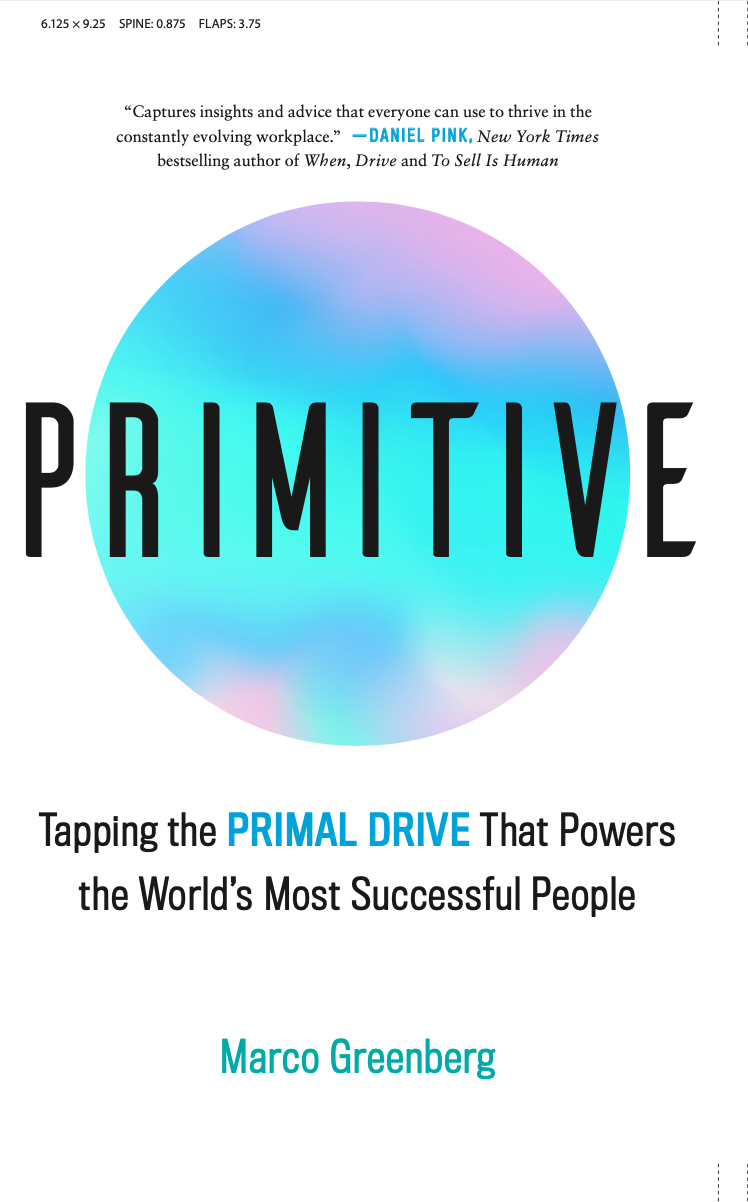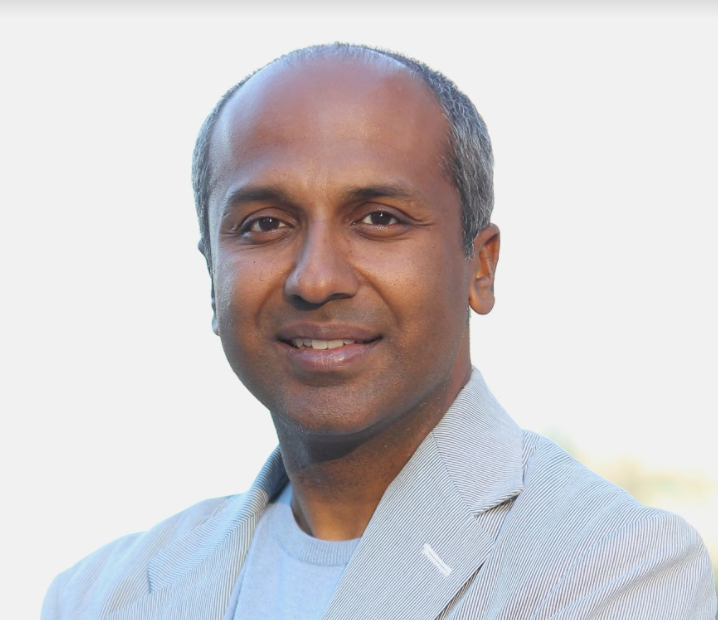I recently spoke with Marco Greenberg about his new book. I’ve known Marco for the last dozen years and he’s one of those hard-to-find P.R .guys who actually knows how to work with journalists like me. We had lunch a couple years back, and he told me he was working on a book proposal about archetypes at work. Not the usual stuff for a marketing pro. I admit to forgetting about it until he reconnected with me to give me a heads up that the book is coming out on April 14. He landed a deal with Hachette, gathered a team of researchers, conducted over 60 interviews and put together a book that looks amazing and that also is of the moment.
It’s called Primitive, Tapping the Primal Drive That Powers the World’s Most Successful People.
I learned more about it last week when he was a guest on my COVID-19 daily call and it really piqued my curiosity. While obviously written before the coronavirus crisis began, there are key take aways that are more relevant than ever. It’s a unique blend of business, self-help and career guide. As we’re all hunkered down, hope you’ll enjoy reading this snapshot of our conversation.
Anything special about your upbringing that made you suited to write a book called Primitive?
It was certainly a nomadic and non-conventional childhood very much different from the one my own children received. I was raised on Venice Beach by hippies in the 60’s and 70’s, pulled out of school for 3rd grade to live on a sailboat in Mexico, pulled out of 8th grade to move to Colorado at 13 on my father’s romantic whim etc. etc. I’ve continued that peripatetic journey, and recently counted that I’ve lived in a total 37 different homes. It taught me the importance of adaptability and flexibility, but also of taking risks and relishing change. When our kids were young, we did what we “were supposed to do,” and my wife and I tried to “settle down” in the more conventional, suburban, CT. It wasn’t for us.
Isn’t this a word, Primitive, with much baggage?
I’d be the first to concede that it’s provocative. My intent is to spark discussion by reclaiming the word, primitive, in its most pure and positive sense. Think about kids and animals. We have research in the book demonstrating how children are naturally curious, asking hundreds of questions a day. Sadly, once teenagers, curiosity is trained out of them, as they become worried about appearing foolish and are shut down by teachers, family and friends and they ask virtually no questions at all. Same with kindness. Contrary to the brutish reputation of the word primitive, at the most basic and innocent level, research also demonstrates that children are kind, and only taught to be mean and prejudiced by parents, peers and others.
What qualifications do you have?
After getting a Masters at Columbia University, my first day at a “real job” I learned an important lesson. I was working for a non-profit organization run by Edgar Bronfman, Sr., a billionaire who was the head of Seagram & Sons, as well as the largest shareholder in DuPont. When he was once challenged about his lack of credentials in the world of public policy, he famously replied, “Sometimes in life you need to create your own credentials.” Now, granted, I’m no titan of industry, but I think a big part of the message in this book strikes a similar chord. Namely, that it’s more about a can-do mindset than impressive credentials. It’s about taking the path less travelled, as the title of a legendary book says, rather than the well-trodden path. Too often, people don’t take action because a feeling that others will think we are unqualified and we buy into that and think we are somehow undeserving. It took a long time for me just to gather the courage and discipline to write a book, for many of the same reasons. On the other hand, some of the people we feature, such as uber-successful primitives from Sir Richard Branson to Arianna Huffington herself, did what their instincts told them to do, rather than what society said they “should” do.
Is there a roadmap that others can use if they want to be primitive?
A few years back I wrote a piece for Thrive Global, and it got me thinking of how ancient archetypes, are still very much at work today, from shepherd to sherpa, from healer to baron. I then scaled that back to two dueling archetypes, primitive and civilized, who actually are very symbiotic and need one another, especially to grow an organization.
Like our ancient ancestors did, I call for people today to go ROAMING. It’s not just a manifesto for free-spirits, but moreover, an acronym that can apply to all those who feel stuck, unsatisfied, underappreciated or just don’t know in which professional direction to head.
Relentless: in pursuing their biggest goals rather than just “working hard.”
Oppositional: they have the courage to challenge the status quo
Agnostic: as opposed to specializing in any one field
Messianic: in spirit and practice to make work a true calling
Insecure: accepting, acknowledging even weaponizing your anxiety and using it to drive your progress.
Nuts: the ability to assess the empirical data but do things most would think totally crazy
Gallant: following a noble path in life and work to help others
Where do you fall on the spectrum?
I certainly lean in the primitive direction, but I’m way too much of a “people pleaser” to be the oppositional primitive or be that nuts — although some might feel differently. It’s all relative. The process of writing the book has taught me to be more “messianic” and putting my own lifelong dreams, following my divine purpose and calling before that of my daily to-do list for others. I often thought that messianic quality was totally grandiose and off putting but I’ve since realized it can usher in all kinds of the most amazing benefits.
You argue some counter-intuitive things, including the advantages of being insecure. Explain.
If there’s one phrase that bugs me the most, that’s become so common place, is that, “it’s all good.” As the current crisis shows us, it’s anything but. Real primitives know the cycle of feast and famine, have an ingrained sense of paranoia, and it keeps them humble and hungry rather than boastful and self-satisfied. Some of the most successful people I know, including those profiled in the book, acknowledge, embrace and even “weaponize” their insecurity rather than parading how confident they are. For example, I feature a former colleague, Riki Drori, who’s now one of the top people at YouTube. She is super talented, dynamic and accomplished and proudly declares she’s one of the most insecure people she knows. She puts herself into the imposter camp. So too, by the way, does a client, Kirk McDonald, who’s now interim CEO of one of AT&T’s largest units, Xandr, and has successfully risen to the very top of corporate America after dropping out of New York’s City College for lack of funds. He uses that same sense of not belonging to fuel him forward.
Who’s the audience?
Kirk McDonald, during my interview with him, inspired an epiphany: that the book is actually less for the primitive people out there and more for civilized people looking to take some calculated risks, and make thoughtful changes to invent or reinvent themselves professionally. The good news is I think the book relevant for all ages, races, ethnicities, genders, professions etc. who are looking for time honored lessons to help them leapfrog in their careers rather than playing by the conventional rulebook. And that “business as usual” is clearly not working for the millions of people who are burnt out, underappreciated and dissatisfied and see work as drudgery rather than joy. The conventional path has also hit a dead end for the millions of people now unemployed because of COVID-19. That starts with being more primal about meeting the full range of our needs.
Managers and leaders may be hesitant to hire Primitives who come from unconventional career paths or who defy civilized norms of the work environment. What benefits are there in hiring PRIMITIVE team-members and employees?
Organizations are all clamoring for the best talent. Much of that talent are not the “cookie cutter” hires but instead the non-traditional hires, who bring a different way of looking at the world. Or course, Steve Jobs is a classic example, but many illustrations are much closer to home. When I got my first job in the marketing agency world, I was struck by a senior colleague, Michael Claes, at what was then the largest PR agency in the world. He managed no one, came and went as he pleased and whose office look the aftermath of a tornado. He described himself as a hunter, bringing in a whale of the client and letting the “farmers” aka civilized dole out the prize.
What are some signs that you have the Primitive itch?
When the current status quo is not working for you. When you get angry and get a chip on your shoulder for not being recognized, promoted and given the opportunity to assume more responsibility or just take on a new role. When you chafe at hierarchy and a more measured and analytical approach, and instead see the benefit of trusting your gut instincts, even, or specially if it means being a bit nuts and audacious. Sure, you can put out a shingle, but most don’t have the backing and persistence to do that. Instead, you can make some “primitive moves” to move up the ladder of your organization, if you do it in a smart way that’s ingratiating rather than alienating.
This year’s graduates will be entering a workforce that has been changing over the last decade into a gig economy. Now they are also contending with an uncertain Labor Market due to COVID-19. How can they use the Primitive principles to find their calling and make themselves stand out to prospective employers?
The first thing to do is to stop fishing for your first job. Meaning, you get online and expect a bite from a job posting, LinkedIn or Indeed. That will mean that you’ll be fishing, especially in economic hard times, in very crowded waters. Instead, they call it job “hunting” for a reason, so pick up that spear! There’s a reason why military terminology has long been omnipresent in business. Use the internet to get personal, in an appropriate way, gather your intelligence, target the right people, and infiltrate an organization. I detail how I pulled off a primitive move earlier in my career and went straight to the top of my first P.R. agency, by personalizing my message to one of the company’s co-founders, after I was already turned down by H.R. and mid-level managers.
The COVID pandemic has sent the global work-force home en masse. Do you anticipate this disruption to the civilized, conventional work environment will lead to a wave of Primitives branching out on their own, turning their hobbies and passions into careers, and otherwise creating working lives more suited to their sense of freedom and lifestyle?
Great question, I anticipate more people these days having a primal moment, when we see just how fragile and uncertain life is, focused on essentials like sustenance, food, shelter, family, connectivity and love that I predict might usher in a collective existential crisis, personal and professional, in our culture. What do we really want to do with our careers, rather than, what we “should” or “must” do? When that happens, look for many more people to change lanes, make some U-turns and take some hard-left turns to get to the professional place they really want to go, rather than zoom straight ahead. Being a primitive need not mean taking a vow of poverty, in many cases quite the opposite, but it does mean putting principles over profits and truly listening to and honoring your inner spirit. Figuring out where you can make the biggest impact, achieve true independence and have some fun along the way. For me that’s what mindfulness at work is all about.

Follow us here and subscribe here for all the latest news on how you can keep Thriving.
Stay up to date or catch-up on all our podcasts with Arianna Huffington here.



